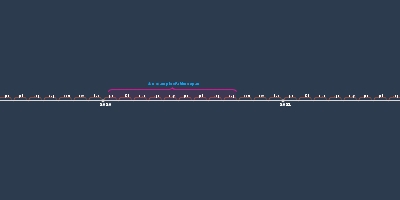Abraham (1 jan 2038 ano antes da era comum – 1 jan 1863 ano antes da era comum)
Descrição:
DATING THE BIBLICAL CHRONOLOGY by Gerard GertouxAbraham was born 60 years after Nahor II (60 + 70 = 205 - 75), because when he left Haran at the age of 75, his father Terah had just died at the age of 205 years (Genesis 11:32-12:4).
Similarly, as Abraham is mentioned first among the son of Nahor II, the copyists of the Samaritan Pentateuch assumed he would be the first-born and therefore decreased the age of Nahor from 135 to 65 (= 135 - 70).
_____
Terah fathered at 130 yo (Vorlage)
_____
How Old was Terah when Abraham was Born?
by Eric Lyons, M.Min.
______
Gertoux, Gérard (2015). Moses and the Exodus Chronological, Historical and Archaeological Evidence
Kudur-LagamarkingofElam
_____
CREATION AND CATASTROPHE CHRONOLOGY
by Barry Setterfield, September 1999
_____
https://www.thetrumpet.com/16554-astronomy-mathematics-and-abraham
Third-century b.c. Chaldean historian Berosus wrote, “In the 10th generation after the Flood, there was among the Chaldeans a man righteous and great, and skillful in the celestial science.” While Berosus did not name this man, first-century a.d. historian Josephus stated that he was referring to the patriarch Abraham. (This aligns with the biblical account, which speaks not only of Abraham being “righteous,” but also in Genesis 11 of his being born in the 10th generation after the Flood.) Further, Josephus pointed to sixth-century b.c. Greek historian Hecataeus, who composed an entire book about the patriarch’s exploits. (Sadly, only two fragmentary works from Hecataeus’s many writings have survived.) First-century b.c. historian Nicolaus of Damascus also wrote of Abraham’s prominence before his sojourn in Canaan.
Sir Walter Raleigh’s The History of the World (1614) referenced first-century a.d. historian Philo of Alexandria, saying that Abraham, through astronomy, “together with the motions of the stars and other heavenly bodies … found out the knowledge of the true God, while he lived in Chaldea.” He further referenced a number of ancient historians who collectively agreed “that Abraham, the holiest and wisest of men, did first teach the Chaldeans, then the Phoenicians; lastly, the Egyptian priests, [astronomy] and divine knowledge” (Chapter 2, Section 2).
Josephus wrote: “[Abraham] was the first that ventured to publish this notion, That there was but one God, the Creator of the universe …. This his opinion was derived from the irregular phenomena that were visible both at land and sea, as well as those that happen to the sun and moon, and all the heavenly bodies, thus:—‘If [said he] these bodies had power of their own, they would certainly take care of their own regular motion; but since they do not preserve such regularity, they make it plain, that in so far as they cooperate to our advantage, they do it not of their own abilities, but as they are subservient to Him that commands them; to whom alone we ought justly to offer our honor and thanksgiving’” (Antiquities of the Jews, 1.7.1).
The quarrel with Abraham came to a head, as Josephus described: “For which doctrines, when the Chaldeans and other people of Mesopotamia raised a tumult against him, he thought fit to leave that country; and at the command and by the assistance of God, he came and lived in the land of Canaan.”
After Abraham arrived in Canaan, a famine forced him to relocate temporarily to Egypt. Josephus provided further details about Abraham’s time in Egypt: “For whereas the Egyptians were formerly addicted to different customs, and despised one another’s sacred and accustomed rites, and were very angry one with another on that account, Abram conferred with each of them. … He communicated to them arithmetic, and delivered to them the science of astronomy; for, before Abram came into Egypt, they were unacquainted with those parts of learning; for that science came from the Chaldeans into Egypt, and from thence to the Greeks also” (Antiquities of the Jews, 1.8.2).
[NOTE the Rhind Mathematical Papyrus (to the right)]
_____
The Merneptah Stela by Charlie Brownonne
Originally Abraham was part of an Amorite migration south into Canaan from Mesopotamia which continued down to Egypt climaxing in the Hyksos rule. In Deuteronomy 26:5 Jacob is called a "wandering Aramean" which is a late term for Amorite (De Vaux 1978, 200).
_____
Josephus (Jewish Antiquities I:93, 158).
Berosus mentions our father Abram without naming him, when he says thus: "In the tenth generation after the Flood, there was among the Chaldeans a man righteous and great, and skillful in the celestial science"
Adicionado na linha do tempo:
Data:
1 jan 2038 ano antes da era comum
1 jan 1863 ano antes da era comum
~ 175 years
